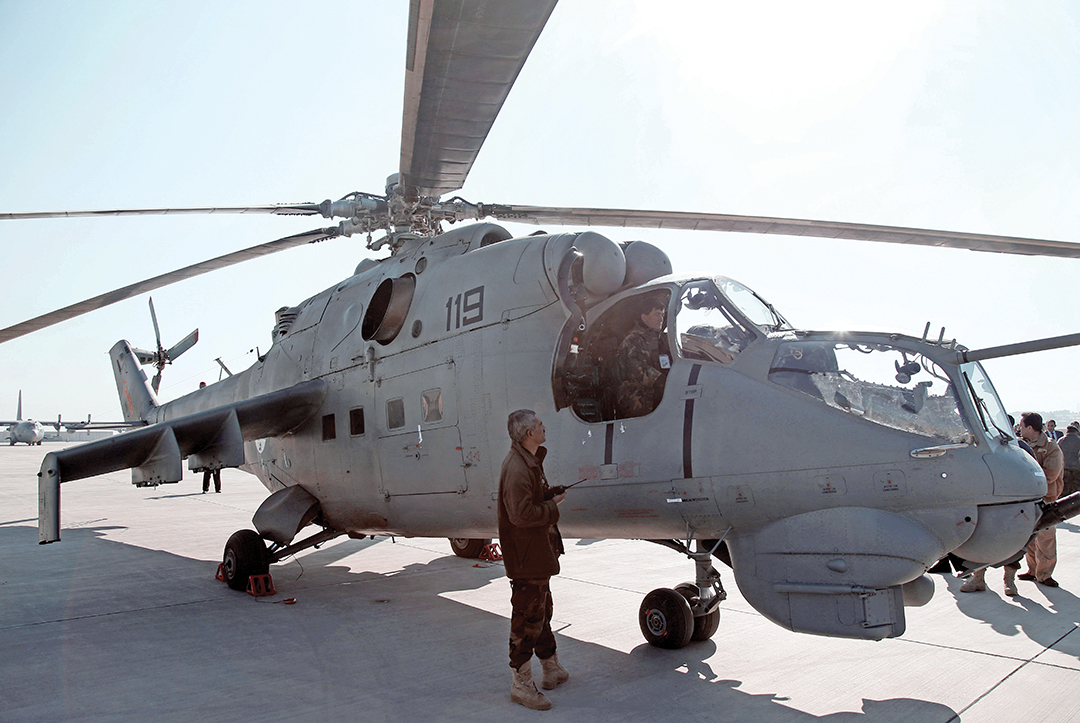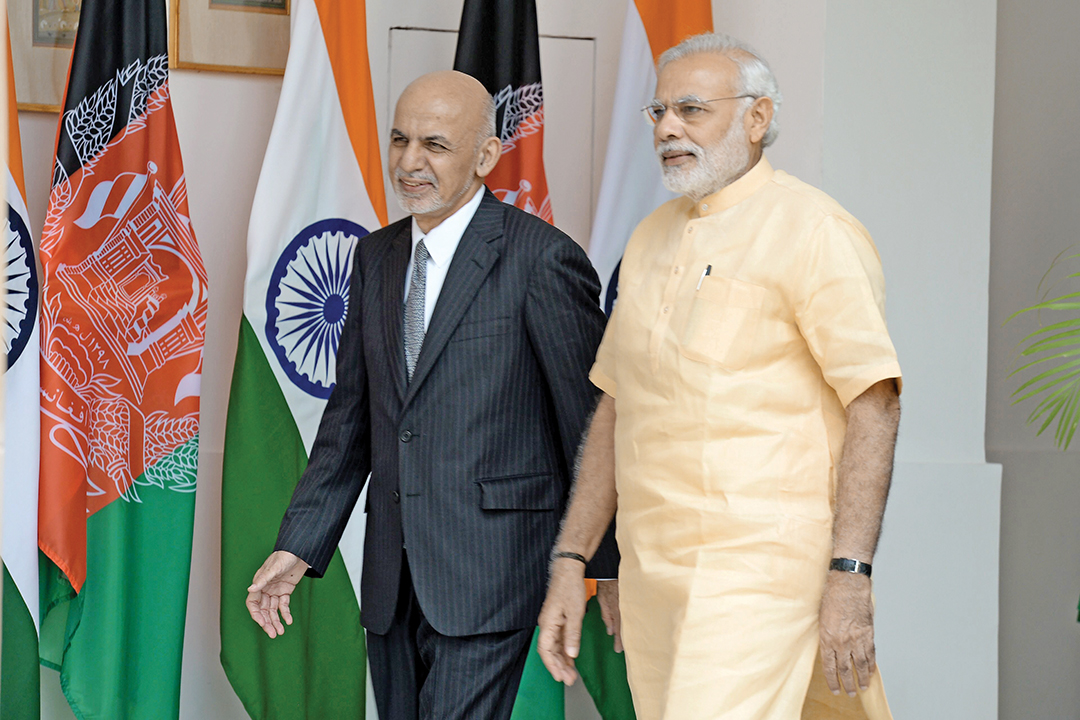India’s policy options in Afghanistan
By Dr. Vinay Kaura
Department of International Affairs and Security Studies, Sardar Patel University
After the Taliban was overthrown in 2001, India renewed ties with Afghanistan and began providing Kabul with substantial assistance for development and reconstruction. Bilateral relations were further strengthened in 2011 by the Strategic Partnership Agreement, through which India provides assistance in rebuilding Afghanistan’s infrastructure and institutions, as well as support for an Afghan-led and Afghan-owned peace and reconciliation process. The agreement also advocates for a sustained commitment to Afghanistan by the international community. Indian Prime Minister Narendra Modi’s government has given special attention to Delhi-Kabul ties. The delivery of Mi-25 attack helicopters to Afghanistan — with approval from Russia — marks a new beginning; an Indian role in strengthening Afghanistan’s combat capability has been a sensitive topic because of Pakistan’s strong opposition. U.S. President Donald Trump’s much-awaited Afghan policy announcement in August 2017 — which cleared the way for more troops in Afghanistan, did away with arbitrary timelines for withdrawal and upped the pressure on Pakistan — also affirmed India’s enhanced profile in peace and development of Afghanistan.
The Pakistan factor in the Afghan conflict is a significant national security concern for India. Pakistan believes its national interests would be better served by the rehabilitation or even takeover of the Taliban in Afghanistan, while India remains apprehensive of likely Taliban hostility and its undesirable impact on Indo-Afghan relations. India has one critical strategic imperative in Afghanistan: to foil the return of a radical and hostile regime. Therefore, drawdowns of American troops in Afghanistan and efforts to legitimize and reintroduce the Taliban into the Afghan power structure are detrimental to India’s security environment. These actions have far-reaching implications for Indian interests in Afghanistan and in the Kashmir valley.

The United States has listened to India’s concerns about America’s attitude in the region, yet remains noncommittal. Notwithstanding Trump’s announced policy shift toward Pakistan, India is not oblivious of the enduring impulses by previous administrations in Washington to forgive Pakistan’s transgressions in Afghanistan. Although India is also discussing conflict resolution in Afghanistan with China, Indian policymakers realize Beijing’s concern is limited to the Eastern Turkistan Islamic Movement in the Afghan-Pakistan border region. Neither can India ignore Russia’s interest in strengthening its relations with Pakistan. It is essential for India to mobilize its own resources and reorient its policy in Afghanistan while closely working with the Trump administration to secure its interests in the volatile region.
India continues to oppose integrating an armed Taliban into the Afghan government. Before that could happen, the Taliban would have to follow all internationally accepted red lines and give up all violence and terrorism. However, if Washington continues to rely on Pakistan and Russia and decreases its hostility toward the Taliban, India might find itself regionally isolated.
At a high-level trilateral meeting in Moscow in December 2016, representatives from Russia, China and Pakistan discussed security in Afghanistan. According to a statement: “The Russian Federation and the People’s Republic of China, as the U.N. Security Council permanent members, confirmed their flexible approach to delisting Afghan individuals from the U.N. sanctions lists as their contribution to the efforts aimed at launching peaceful dialogue between Kabul and [the] Taliban.” The absence from the meeting of an Afghan representative created a controversy over Russian intentions. Kabul firmly objected to being left out, and the U.S. also questioned Russia’s motives in organizing the talks. The criticism prompted Moscow to include Afghanistan and India in a February 2017 meeting, during which India’s ministry of external affairs, in an indirect reference to Pakistan, supported denying “safe havens or sanctuaries to any terrorist group or individual in countries of our region” as essential to stabilizing Afghanistan.
Moscow views the Taliban as a useful partner in its fight against ISIS. Russian President Vladimir Putin has long worried about jihadists from former Soviet republics joining ISIS in Syria. For this reason, Russia sees ISIS as the greater threat. In January 2016, Putin’s special representative to Afghanistan, Zamir Kabulov, candidly acknowledged, “Taliban interests objectively coincide with ours. Both the Afghan and the Pakistani Taliban have said they don’t recognize ISIS and they don’t recognize the ISIS leader al-Baghdadi as the caliph; that is very important. We have communication channels with the Taliban to exchange information.” In a September 2016 address to the U.N. Security Council, Russia’s permanent representative to the U.N. stressed that the U.S. and NATO were responsible for the deteriorating situation in Afghanistan and added that killing Taliban leader Mullah Akhtar Mansoor paved the way for extremist groups such as ISIS to become stronger in Afghanistan. Brushing aside accusations of collaboration with the Taliban, Russian Ambassador to Afghanistan Alexander Mantysky said that American and Afghan officials “are trying to put the blame for their failures on our shoulders.” Kabulov described the Taliban as “local, Afghanistan-based” and “predominantly a national military-political movement.” While Russia’s peace efforts are appreciated, its overt contacts with the Taliban have led to skepticism in Kabul and New Delhi. However, Russia maintains its “limited contacts with the Taliban…are aimed at ensuring [the] safety of Russian citizens in Afghanistan and encouraging the Taliban to join the national reconciliation process under the leadership of Kabul and on the basis of three well-known principles: the recognition of the IRA Constitution, disarmament, break-up of its ties with IS, al-Qaida and other terrorist organizations.”
Attempts by Afghan President Ashraf Ghani’s government to find a political settlement with the Taliban have been unsuccessful. American attempts at pressuring the Pakistani government to deny safe havens to insurgent groups destabilizing Afghanistan, especially the Afghan Taliban and its brutal ally, the Haqqani network, have similarly failed. U.S. troops numbered 8,400 in July 2017, the lowest level since the mission began, though Trump promises to increase the troop levels by an unspecified number. The Ghani government welcomes the promise of more assistance, as the rise in attacks on Afghan civilians, security forces and state infrastructure points to the increasing strength of the Taliban and other terror groups. The Afghan Army and police lost 6,200 men in 2016, and it is believed that police casualties are averaging two to four times higher than recruitment. According to a U.N. estimate, there were 3,498 Afghan civilians killed and 7,920 wounded during 2016. Although the Afghan government has attempted to reform the security forces, those efforts have been overshadowed by political disputes between President Ghani and his government’s chief executive, Abdullah Abdullah. Inept command, poor training standards, endemic corruption and insufficient air support have made it very difficult for the Afghan security forces to hold territory without the help of foreign troops. That is why increasing the number of American troops in Afghanistan is essential.
Presently, India is a peripheral player in Afghan political affairs, focused on reconstruction and developmental activities. Lacking any traction with Pakistan and the Taliban, India is on the sidelines of the current peace talks. And Trump’s public criticism of Pakistan’s double-dealing is merely words. Turning the words into action on the ground will be extremely difficult. The new U.S. administration is not likely to favor ending the pretense of cooperation with Islamabad because it believes that doing so would undermine American interests in Pakistan. Given the resilience of the Taliban insurgency and the inability of the Afghan government to support itself, such a break is unlikely to happen anytime soon. Moreover, Russia’s decisive Pakistan-Afghanistan policy shift presents crucial challenges for India in the long run. Because of Afghanistan’s fast-deteriorating situation and changing strategic dynamics, India should frame its policies by looking at all available options. The following factors should be considered:
Because Pakistan has built its national identity narrative around Islam, Pakistani rulers have remained consistently committed to concepts of pan-Islamism. Pakistan is unlikely to abandon jihadism without a fundamental reorientation of its core ideology. Thus, expecting a radical change in Pakistan’s strategic orientation toward terror groups will only produce frustration in Afghanistan, India and the U.S.

There is no evidence that China’s increasing economic and political involvement in Afghanistan might eventually motivate Beijing to place pressure on Pakistan to disengage its security establishment from ties with terrorist groups. Pakistan is unlikely to face united international pressure regarding its policies, as sharp divisions are emerging among the large powers on how to deal with the Afghan problem.
The U.S. is unlikely to abandon Afghanistan easily because Washington has spent an unprecedented amount of human and financial resources there. However, the Trump administration has taken no concrete actions to prevent Russia, China and Pakistan from taking the Afghan issue into their own hands. It is, therefore, in India’s interests to remain engaged diplomatically with Russia and China, despite their lack of interest in India’s concerns regarding Afghanistan.
Pakistan’s crucial geo-strategic location makes it in U.S. interests to maintain friendly relations. The American agenda of exiting Afghanistan with Pakistan’s support has indeed contributed in the latter becoming the most important player in Afghanistan. Although the Trump administration is considering a harder stance against Pakistan, it is not clear whether it will continue Obama administration policies or implement a markedly different approach to Pakistan’s role in Afghanistan.
New Delhi must continue to counter the oft-repeated Pakistani argument that India’s pressure on its western border distracts the Pakistan Army from taking decisive action against insurgents on its eastern border with Afghanistan. This argument helps Pakistan to avoid punitive measures for its complicity with the Afghan Taliban.
Some in Pakistan argue that its motivation for accommodating Afghan-oriented terror groups is to avoid retaliation by those groups. India should forcefully counter this misguided claim because it is intended to deceive the international community.
If Pakistan wants an influential role in Afghanistan, it must make a decisive shift in its traditional Afghanistan policies. Pakistan needs to pay more attention to reconstruction and development efforts in Afghanistan. Since Pakistan’s support is also required for security and stability, focus on reconstruction projects would earn greater acceptance among Afghans. India should convey through official and unofficial channels that if Pakistan is sincere in providing aid to Afghanistan, it will find a reliable partner in India.
Because of Pakistan’s centrality to U.S. war efforts and the significant presence of Western troops in Afghanistan, India has limited its exposure in the Afghan conflict. Because these conditions will change sooner rather than later, India should clearly map out its future posture in Afghanistan. In his August 2017 policy announcement, Trump called on India to do more in Afghanistan, especially with economic assistance and development.While focusing on building the capacity and cohesion of the Afghan state and its security forces, Indian policymakers should seriously reassess their traditional opposition to rehabilitating the Taliban and integrating it into the Afghan power structure because it has become clear that the Taliban insurgency cannot be defeated by military means alone. Additionally, some Taliban elements are keen to open a channel of communications with India; it would be consistent with India’s Afghan interests to make secret and discreet contacts without conferring legitimacy on the group.
Changing policy so dramatically will be difficult. However, Indian leadership would be strategically deficient if it continues to pursue a strategy that has not worked. It is important for India to understand the merits of a broader political approach in Afghanistan that includes talks with the Taliban. If the Russia-China-Pakistan troika succeeds in turning the ongoing talks into a settlement with the Taliban without Indian concerns being addressed, it will certainly affect India’s interests — but those interests will come under greater risk if the Taliban insurgency continues to gain ground after U.S. troops eventually leave Afghanistan. There is much that India and the U.S. can do together to create durable security in Afghanistan, rather than working on parallel but separate tracks.


Comments are closed.